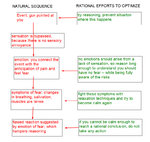Yamato
Legendary member
- Messages
- 9,840
- Likes
- 246
Perfect, concise explanation of new E.S.E.S.A. method with examples
OK.
Back at work.
The orangutan just came into the room, singing out loud, like an idiot, no specific tune. Sighing "oh god... oh god...". Aside from "good morning" we didn't say anything to each other. Now he left and went to look for action in someone else's room.
And he's restraining himself. He's showing me respect by not telling me whatever he has on his mind, which he does with most other people.
He's singing obnoxiously so he doesn't have to interrupt me from working (so to speak), which he regularly does with other people. Now he's whistling.
Gee. What an animal.
Anyway, here I am, with new advances in the now renamed ESESA theory.
Ready? Here it goes, new acronym of ESESA instead of ESESS because I want to describe the last phase of Action (to be stopped) rather than focusing on the idea that I have to Stop the Action:
Event
Sensation
Emotion
Symptom
Action
I would rather have a sequence that I can coherently define "the sequence of x situation" than a sequence which is (as it was) half one type of sequence (what happens in you) and the other half another type of sequence (what you should do).
One last remark. There is no definite threshold/border between symptom and action, and it is an arbitrary division between the two, based on the gravity. If I scratch my head, that is a "symptom", because it causes me no big damage, but just wasting time, but if I reply to my boss "go screw yourself" that is an "action", because it jeopardizes my future in a more serious way. In reality, they're both symptoms of emotions, and they're both also actions produced by our emotions.
So this new sequence can be basically defined as the chain of events that originates from an unpleasant event and ultimately leads you to an irrational action. It is a sequence of events which should be fought, avoided and prevented. And you should apply your efforts at every phase of the sequence. All phases except the first one can be efficiently aborted through relaxation techniques (mainly deep breathing and muscle relaxation).
ALL EMOTIONS COME FROM SENSATIONS
Emotions are all caused, in my opinion and from what I've understood so far, by sensations, anticipations of sensations or memories of sensations.
Of course a loud noise directly disturbs us and that is a direct link between sensation and emotion: 1) orangutan sings (he's quite loud), 2) the auditory sensation disturbs me, 3) I get frustrated because I cannot focus on my work.
But then, if when I see the orangutan, I feel fear, then this is not a direct link between sensation and emotion, since it arises from seeing someone who makes you feel acoustically (and physically) threatened, and therefore it is an emotion that arises via an anticipation (and memory) of the sensation of pain (physical or acoustical).
Some other examples. Happiness could arise from knowing that you'll screw some girl in the near future. Serenity can come from having lots of money in your bank account. I think that ultimately the root cause is sensation.
By the way, the orangutan and his noises are a perfect example.
Event
We could not stop the event. The orangutan is here and he's being himself, thereby producing acoustical disturbances...
Sensation
...He's making loud noises, I can't wear earplugs here, so the unpleasant sensations cannot be avoided and reach me...
Emotion
...the noises distract me from my work and I would feel a natural stress. Now I am trying through relaxation techniques and simple reasoning to stop the emotions (anger and frustration) that arise because someone is distracting me and keeping me from working (I was actually doing office work when he came in, and now I am doing intellectual work and he's still distracting me). I am trying to limit my emotions to those arising from the auditory stress, which cannot be avoided, rather than, as I used to do, add a whole burden of negative emotions stemming from the fact that I identify an injustice taking place (why do I have to be polite and he can be an animal? Why do I respect social rules while he doesn't?). But injustices are part of reality and I have to accept reality without fighting it or I'd waste time (except in the cases when I can fix reality).
Symptoms
As emotions will manifest themselves in my mind, my body will keep up and I will first feel tense muscles, especially around my eyes and the sides of my mouth -- usually this is the effect the orangutan noises have on me. I can try to control those, too, again via relaxation techniques, and, by doing so, from what I've read, I am also reducing/cancelling the emotions that caused the symptoms (that link I gave you days ago said that if your body is relaxed, your mind follows suit).
Actions
Should the symptoms continue or get worse, I will know that I am not in control of my reasoning, and therefore I should abort all further actions or it won't be reasoned action, but influenced by emotions. E.g.: yelling something at him or giving him a dirty look. No good, because I know the best course of action is to completely ignore him, don't talk to him, give him short answers and look relaxed but also look as busy as possible.
OK.
Back at work.
The orangutan just came into the room, singing out loud, like an idiot, no specific tune. Sighing "oh god... oh god...". Aside from "good morning" we didn't say anything to each other. Now he left and went to look for action in someone else's room.
And he's restraining himself. He's showing me respect by not telling me whatever he has on his mind, which he does with most other people.
He's singing obnoxiously so he doesn't have to interrupt me from working (so to speak), which he regularly does with other people. Now he's whistling.
Gee. What an animal.
Anyway, here I am, with new advances in the now renamed ESESA theory.
Ready? Here it goes, new acronym of ESESA instead of ESESS because I want to describe the last phase of Action (to be stopped) rather than focusing on the idea that I have to Stop the Action:
Event
Sensation
Emotion
Symptom
Action
I would rather have a sequence that I can coherently define "the sequence of x situation" than a sequence which is (as it was) half one type of sequence (what happens in you) and the other half another type of sequence (what you should do).
One last remark. There is no definite threshold/border between symptom and action, and it is an arbitrary division between the two, based on the gravity. If I scratch my head, that is a "symptom", because it causes me no big damage, but just wasting time, but if I reply to my boss "go screw yourself" that is an "action", because it jeopardizes my future in a more serious way. In reality, they're both symptoms of emotions, and they're both also actions produced by our emotions.
So this new sequence can be basically defined as the chain of events that originates from an unpleasant event and ultimately leads you to an irrational action. It is a sequence of events which should be fought, avoided and prevented. And you should apply your efforts at every phase of the sequence. All phases except the first one can be efficiently aborted through relaxation techniques (mainly deep breathing and muscle relaxation).
ALL EMOTIONS COME FROM SENSATIONS
Emotions are all caused, in my opinion and from what I've understood so far, by sensations, anticipations of sensations or memories of sensations.
Of course a loud noise directly disturbs us and that is a direct link between sensation and emotion: 1) orangutan sings (he's quite loud), 2) the auditory sensation disturbs me, 3) I get frustrated because I cannot focus on my work.
But then, if when I see the orangutan, I feel fear, then this is not a direct link between sensation and emotion, since it arises from seeing someone who makes you feel acoustically (and physically) threatened, and therefore it is an emotion that arises via an anticipation (and memory) of the sensation of pain (physical or acoustical).
Some other examples. Happiness could arise from knowing that you'll screw some girl in the near future. Serenity can come from having lots of money in your bank account. I think that ultimately the root cause is sensation.
By the way, the orangutan and his noises are a perfect example.
Event
We could not stop the event. The orangutan is here and he's being himself, thereby producing acoustical disturbances...
Sensation
...He's making loud noises, I can't wear earplugs here, so the unpleasant sensations cannot be avoided and reach me...
Emotion
...the noises distract me from my work and I would feel a natural stress. Now I am trying through relaxation techniques and simple reasoning to stop the emotions (anger and frustration) that arise because someone is distracting me and keeping me from working (I was actually doing office work when he came in, and now I am doing intellectual work and he's still distracting me). I am trying to limit my emotions to those arising from the auditory stress, which cannot be avoided, rather than, as I used to do, add a whole burden of negative emotions stemming from the fact that I identify an injustice taking place (why do I have to be polite and he can be an animal? Why do I respect social rules while he doesn't?). But injustices are part of reality and I have to accept reality without fighting it or I'd waste time (except in the cases when I can fix reality).
Symptoms
As emotions will manifest themselves in my mind, my body will keep up and I will first feel tense muscles, especially around my eyes and the sides of my mouth -- usually this is the effect the orangutan noises have on me. I can try to control those, too, again via relaxation techniques, and, by doing so, from what I've read, I am also reducing/cancelling the emotions that caused the symptoms (that link I gave you days ago said that if your body is relaxed, your mind follows suit).
Actions
Should the symptoms continue or get worse, I will know that I am not in control of my reasoning, and therefore I should abort all further actions or it won't be reasoned action, but influenced by emotions. E.g.: yelling something at him or giving him a dirty look. No good, because I know the best course of action is to completely ignore him, don't talk to him, give him short answers and look relaxed but also look as busy as possible.
Last edited:









